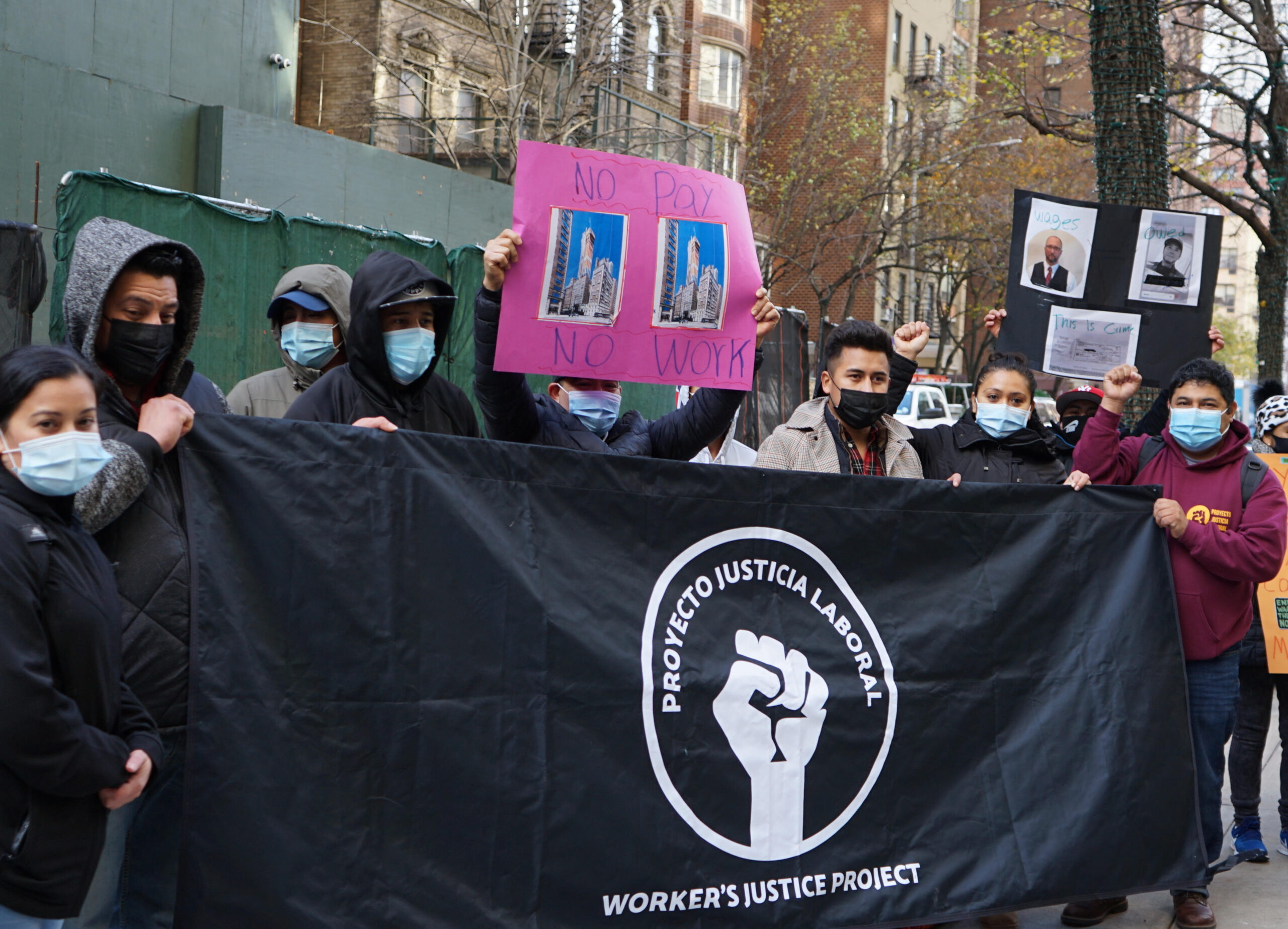MANHATTAN — Osmar Cruz had enough.
For about two months, this painter worked with 13 other day laborers doing plasterwork inside a luxury apartment building on Manhattan’s Upper East Side. But by Dec. 1, a subcontractor had not paid them.
Being day laborers, they weren’t full-time employees with a human resources department to address the problem.
Consequently, they turned to the Brooklyn-based Worker’s Justice Project (WJP), which conducted a “wage-theft” protest outside the apartment building on Dec. 1 for the workers. WJP aimed to force the main contractor to pay them a total of $29,000 in unpaid wages.
Ligia Guallpa, WJP’s executive director, said cases like these had increased since March when the COVID-19 pandemic forced a throttling of the U.S. economy. Before then, WJP saw about four instances of wage theft per week. In recent weeks, however, the weekly average has grown to 11, according to Guallpa.
“This is very common in the construction industry,” Guallpa told The Tablet after the demonstration. “Now they have no rent money; they can’t feed their families. Today they said ‘enough is enough.’ ”
Cruz immigrated as a minor five years ago from Guatemala. As an adult, he continues working in the U.S. under the Deferred Action for Childhood Arrivals (DACA) policy created during the Obama Administration.
He is among 3,500 day laborers who pay $50 a year for membership to the WJP, which has stood up for people like them since 2010.
These workers get hired through “informal agreements” with employers to do temporary tasks, such as construction, landscaping, and house cleaning, to name a few.
And they do have rights, according to state and federal labor laws, even people who are undocumented workers.
“This is something that is very important for the community to know,” Guallpa said. “It doesn’t matter your immigration status, if you worked for an employer, you’re entitled to a minimum wage, overtime pay, basic sick leave, and you are entitled to be paid on time.”
Still, day laborers often work long hours with no overtime compensation or meal breaks, are in unsafe work conditions, and have illegal deductions taken from their pay.
Some undocumented workers don’t complain because employers threaten to report them to immigration officials, Guallpa said.
“Unfortunately,” she added, “unethical businesses have really taken advantage of that. In New York City, we’re talking more than a billion dollars have been stolen from workers.”
Guallpa noted that this situation “is definitely COVID related.”
“Because a lot of businesses are closing down, workers have been forced to work in new industries, but industries that are more exploitive,” she said. “A good example is the food delivery business.”
Guallpa explained that during restrictions on indoors dining, restaurants stayed afloat through takeout deliveries. Online services that process the orders are booming, she said, but some of them exploit the delivery guys by dispatching them on longer trips without commensurate pay.
Some delivery workers are cheated out of their tips or have no access to the bathrooms in the restaurants they deliver for, Guallpa said: “If they complain, they get fired.”
Domestic workers also suffer COVID-related risks as they clean and disinfect homes and businesses where the coronavirus lurks, Guallpa said.
Some employers insist the workers attack the virus with more powerful cleaning solutions that are very harsh to eyes, skin, and respiratory systems. Frequently, however, no protective gear is provided, Guallpa said.
“Their biggest fear is of getting sick and dying,” Guallpa said of these workers. “But on the other hand, they say, ‘What other choice do I have? Without work, I die.’”
Church Teachings
Bishop Mario E. Dorsonville, auxiliary bishop of Washington, recently told members of Congress that the cChurch advocates for the “dignity of work” of all people, including immigrants. He is the chairman of the Committee on Migration of the U.S. Conference of Catholic Bishops.
“The contributions of essential workers have become undoubtedly more important during COVID-19,” he told a House subcommittee on immigration. “While many essential workers are U.S. citizens, many are also immigrants and refugees.”
The bishop said the Catechism of the Catholic Church mandates the fair treatment of all workers. It states, “A just wage is the legitimate fruit of work. To refuse or withhold it can be a grave injustice. Remuneration for work should guarantee man the opportunity to provide a dignified livelihood for himself and his family.”
Bishop Dorsonville also quoted passages from the Old and New Testaments of the Bible:
“So, you, too, must befriend the alien, for you were once aliens yourselves in the land of Egypt.” (Deuteronomy 10:19)
“I was a stranger,” Jesus said, “and you welcomed me.” (Matthew 25:35)
“Immigrants and refugees are a blessing to our country,” Bishop Dorsonville told the subcommittee.
Possible Results
The protest on Dec. 1 may have brought results. Before it ended, the main contractor called the group and agreed to a sit down with them by the end of the week.
The workers and their WJP supporters realized negotiations could take longer, but they hoped for a swift resolution.
Meanwhile, WJP has a fundraiser underway to help workers struggling during the pandemic. The goal is to raise enough money to give $250 checks to 100 workers, Guallpa said.
Osmar Cruz (right of center, black mask) and fellow day laborers protest unpaid wages for the plasterwork they performed at a luxury apartment building on the Upper East Side of Manhattan. The Dec. 1 demonstration was organized by the Workers Justice Project, which is based in Brooklyn. (Photo: Courtesy of Ligia Guallpa, Workers Justice Project)

